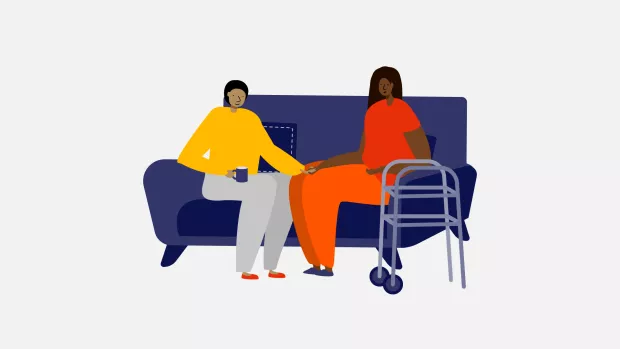
Contraception (birth control) and MS
Some people find MS symptoms or treatments affect the contraception they choose.
Here are answers to some of the key questions you might have about MS symptoms, MS treatments and contraceptives.
Does MS affect what contraception I choose?
Lots of people with MS find it doesn’t affect their choice of contraception. But sometimes MS symptoms can make it harder to use barrier methods like the cervical cap, the ‘sponge’ or condoms.
It’s good to talk to your sexual partner and doctor about the different options available to you.
Contraception and STIs
Condoms are the only contraception that reduce the risk of catching or passing on many sexually transmitted infections (STIs).
Should I worry about blood clots with MS and hormonal contraceptives?
Some hormonal contraceptives (pill, injection or implant) can increase the risk of clots. And if your MS means that you can’t move around much, you might have a greater risk of blood clots.
Speak to your doctor about it. There could be other methods that are more suitable. Your doctor might monitor you for any early signs of problems.
Can people with MS take the pill and other hormone-based contraceptives?
People with MS can usually take the pill and other hormone-based contraceptives. But some medications and herbal supplements can raise the chances of them not working.
The evidence suggests that hormonal contraceptives don’t increase relapses or make MS progress more quickly.
Some studies have also looked at whether these contraceptives might delay the development of MS, or affect the chances of getting MS. But they’ve had mixed results on this and there’s not enough evidence to show an effect. We hope more studies will shed light on this.
Can MS treatments or complementary medicines stop my contraceptive from working?
DMTs are not thought to affect how well hormone-based contraceptives work. But some medications and herbal supplements can increase the chance of hormone-based contraceptives failing, including:
- carbamazepine (Tegretol) which is used for spasms and pain
- phenytoin (Epanutin) which is used for severe MS-related pain
- hypericum extract (St John’s Wort) a herbal remedy for depression
You might want to speak to your doctor or MS team about finding ways to manage your treatments and contraception.
Do I have to use contraception if I take a DMT for my MS?
If you take certain DMTs for your MS, it’s important to use reliable contraceptives. That’s because some DMTs could harm a developing baby.
If you want to get pregnant, you might need to stop taking your DMT or switch to a safer one. With some DMTs you need to stop some weeks or months in advance to be sure they’re out of your system.
Your neurologist or MS nurse can discuss any precautions you’d need to take with your DMT. Speak to them before you make any changes.
DMTs and sperm
The DMT cladribine (Mavenclad) can interfere with the quality of sperm. This can potentially lead to problems in the baby. So you need to use condoms or other reliable contraception while taking cladribine and for 6 months after the last dose.
There have previously been worries about the transfer of teriflunomide (Aubagio) to partners through semen. So your neurologist might also discuss precautions if you use teriflunomide.
Last full review: 30 March 2022
We also update when we know about important changes.




